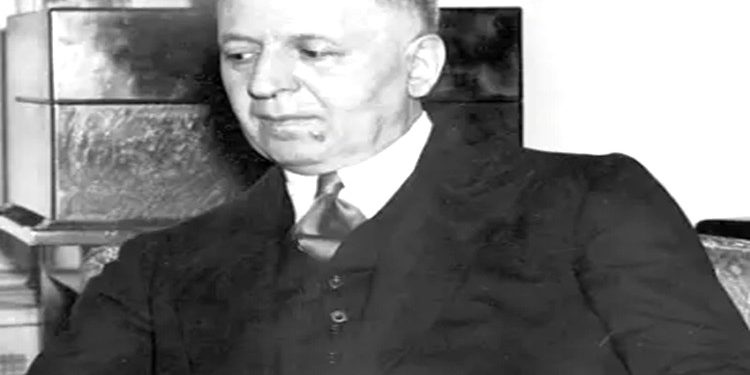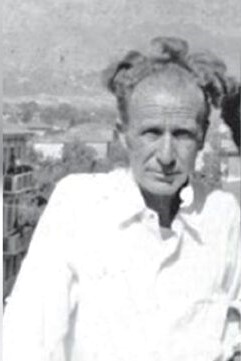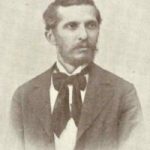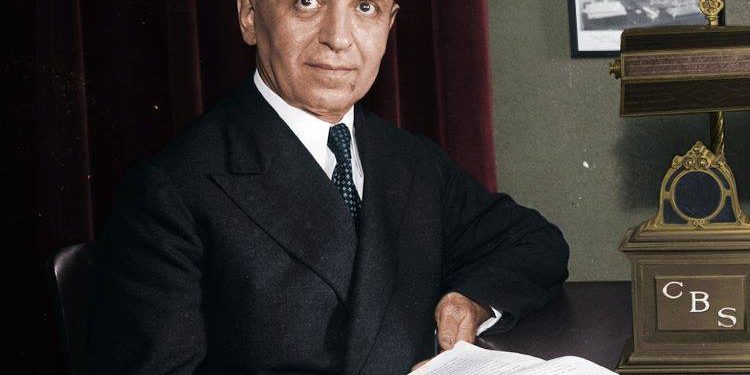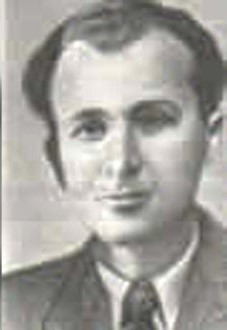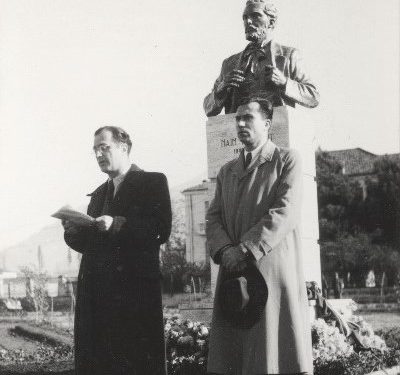Nonda Bulka against Konica
(“SHTYPI” Newspaper, Tirana, August 1937)
Memorie.al / In the July 28 issue of the newspaper “Dielli,” Mr. Faik Konica has put Naim Frashëri on trial. This time, Faik Bey started the polemic with sacred corpses. He completely denies, without any hesitation, any literary value to the nightingale of Frashër. Distinguished professors like Kostaq Cipo, people who know how to use the pen like Krist Maloki, have told and written to us that Naim has literary value; that Naim has a poetic flair. We have been nourished, Faik Bey, by Naim’s verses, and today you come out and insist that we vomit them up because they have no value. Faik Konica doesn’t want Naim to be a poet; he doesn’t like it; he doesn’t have an account for such a thing. Why, I wonder? Because if Naim were alive, he might have been angry with him. However, the matter is different.
“Le cœur a ses raisons que la raison ne connaît point,” as Pascal says. Maybe even Faik doesn’t know why he despises Naim so much?! “Naim is a poet of toto and tatata,” says Faik; and he tells the following anecdote: Thirty years ago, an Albanian from Romania apparently said that Naim Frashëri is the Homer of the Albanians. Faik supposedly heard that word and got angry. He didn’t even want to eat bread out of spite. However, the Albanian from Romania, Nikola Naço, pulled Faik aside and assured him that what he said about Naim was a joke. This is how Faik Bey’s anger subsided, and he sat down and ate bread.
Faik himself tells this anecdote in his venomous article against the idol of our youthful days. Thirty years later, in 1937, Faik weaves, or rather builds with his pen, a coffin where Naim Frashëri is to be buried, as a poet and as a writer. “Naim was not only not a great poet or writer, but he was not even a small one. He didn’t know how to write at all.”
This is what Faik says, but it is not so. “Naim’s verse,” Faik adds, “is a bunch of political propaganda documents and nothing else.” For Faik Bey, Naim has not the slightest literary value. And he proves it to us by citing Naim’s weakest verses. And then he gives advice on how masterpieces are written. He mentions Bossuet, Swift, Flaubert, and La Fontaine. And he implicitly complains about why Naim didn’t produce masterpieces like them. We have also heard the names of the writers in question, Faik Bey. The world moves forward. Albania is no longer what you left. There is also elite here who can judge and more or less appreciate masterpieces.
But you are grossly mistaken when you judge Naim by having Bossuet on the table. Albanian works are not commented on that way. Your argument is neither convincing nor devastating! “Naim wrote ‘vers de militon,’ which in Albanian is called ‘vjersha toto tata’,” says Faik.
How easy it is to criticize a poet. You can always find their weak point. If you approach the work that way, what poet doesn’t have their flaws? Even Hugo, even Vigny, even Alfieri, have stanzas that you could call “nonsense by the bagful,” or rather “babble,” as Faik calls Naim’s poetry. But the poet is generally a Whole. “Un touts.” In this “whole” there are good things, and not-so-good things. Faik Bey leaves aside Naim’s good things, and brings out the bad ones. Is this a way to judge the works of a poet that a whole people completely adore? Most of the time, Naim felt what he wrote. And what is felt can only be expressed well when a person has a poetic flair. And Naim Frashëri has a poetic flair. But Faik Bey doesn’t want Naim to have a poetic flair.
The little David comes out and says to Goliath: You are wrong! Goliath will be a little angry, but there’s nothing we can do. This is how this world is. It is round. And as such, it comes around. And as it comes around, it lifts us up or cuts us down according to its whim. Today Faik Bey has fallen. Because Naim is a distinguished poet. Faik’s pen, however sharp, cannot sink him into the ground.
Naim is not buried with an article in a newspaper. Naim has been a poet of the National sentiment, a lyric poet of the first rank. He has been a poet of love, of sorrow, and of nature. Naim knows how to write Albanian very beautifully, very purely. Read with attention, Faik Bey.
“In your face I found beauty,
Like him who found divinity in the mountain,
The May blossoms are so good,
But before you, they tasted bad.”
Simple, beautiful images. Where can you easily find a line like this?
“I saw peaches among the leaves,
I remembered your bosom.”
Faik Konica knows a lot about literature. Such a thing cannot be denied. Today Faik comes out and says that Naim has no value. But it is certain that Naim has value, even much greater than he has been given. How can this be explained? One of two things: Either Faik does not understand, or he has not read Naim. The second must be believed; because we have removed the first a priori. Faik has read Naim completely superficially.
“Naim did not pay attention to the language or the reason,” adds Faik. Naim has paid attention to both the language and the reason, but when a person is consumed by passion, he doesn’t know what he is saying. It is surprising. Everyone says that Faik Konica is one of the best writers in Albania. The truth is that there are few, very few, who have read his two very beautiful works, one original, and one translation.
(Faik Bey worked for over forty years and could only donate two works to the Homeland, and even those are invisible! – This is called: “Fecondite”). Anyway. The people go after the rumor…! Because some shouted at the beginning that Faik writes beautifully, others shouted later. But just because Faik has literary value, this does not allow him to write whatever he wants. Blind people do not exist in this century.
Whatever the intellectual’s stomach cannot digest, even if that thing comes from Faik’s pen? Faik’s pen continues to vomit, and says: The mirror of his “Style” were the songs of the Maleshovite beggars, in their torn and creeping language that looks like the speech of a drunk child.” Naim has spoken like a drunken child! This is what a drunken child has written, Faik Bey.
Read:
“I will lie down
To wither,
Like a candle when there is no oil,
Dust and mud,
I will become,
So her foot can tread on me,
And I will rest,
By kissing,
That foot then.”
If this one who wrote this poem is a “drunk child,” then Faik Bey, all 1 million Albanians (except you), are all drunk children. Only you are sober…! Your thoughts on Naim are completely partial. Naim cannot answer. Because he died many years ago.
But his spirit is rooted in our soul. And that spirit is sending you its revolted Echo today, against the poisoned judgment you are spreading in Albania. And Faik Konica continues, with his pure style, but empty of thoughts.
-“Those who want to have fun, by entering a madhouse, where thoughts and words have neither connection nor meaning, should read a long poem called ‘Paradise.’ One of the strange things here is the news that Albanians were created not only before Adam, but also before the moon.” Here is the poem that Faik Bey calls a madhouse:
“Adam had not yet been born,
His umbilical cord had not been cut,
He was water and mud,
We were a lofty people,
The moon was not yet in existence,
The earth had grass and leaves,
When the Albanian was born,
He is the first of all!
He named the gods,
And all the livestock,
He reigned everywhere…!”
Why, I wonder, does this poem resemble a madhouse? Naim is not doing history or sociology, or astronomy. He is doing poetry. And in poetry, many things are allowed. Naim’s chauvinistic patriotic feeling is expressed in a lyrical way. Why do the Germans and Japanese say they are a people chosen by God? Do they not know, I wonder, that this is not true? Was it a disaster because Naim said that the Albanian people were born before the moon was born? If one judges poetry this way, all poets without exception turn out to be crazy.
Or perhaps 1 million Albanians (except Faik), are crazy! Who knows…?! Faik adds: “But when we call a poet, and a great poet a maker of toto and tatatash, what word will be left for a Gjergj Fishta?” Faik Bey, there is a place in Albania for both Father Gjergj and Naim.
One does not exclude the other. Two poets (and more than two), can live, I mean, they can be coordinated. Can’t they? What do you think, sir? Just because Father Gjergj is a great poet, does this mean that Naim is a mere verse-maker and a babbler? This does not seem to me a serious and valid reasoning. Just because Naim used the verb “ishte,” instead of “ish,” and “pellazgjitë” instead of “pellazgët,” is this a poetic crime, or rather a linguistic one?
But the famous apostrophes that the poets of the north use today, why aren’t they also a “mistake”? Poetry allows many things that are forbidden in prose. You, Faik Bey, know better than anyone; but when you decide to bury (even if dead) a person, you use every means. And some verses, not the best ones, to show Faik Bey that Naim is a poet…
“My chest is pierced,
I have made holes in it,
And I have cried and groaned,
With thousands of sighs.”
The poet and the flute. The poet equates himself with the flute that cries in solitude, amidst wild nature. And in his masterpiece “Livestock and Agriculture,”
“Where the cold water springs, and the north wind blows in summer/
Where the flower grows with much joy, and with beauty and in the air/
Where the shepherd blows the whistle, where the livestock graze/
Where the goat with bells moans, there my thoughts are.”
Our Great King, the people, and the Government, by bowing before the bones of the nightingale of Frashër, honored not only the high pioneer of nationalism but also the poet; they sincerely honored that poet, whose value Faik Konica in vain seeks to destroy. Now as I am writing these lines, I ask myself: Does Faik Konica seriously believes what he writes? Or does he like to write the exact opposite of what the majority thinks?
Because we live in the century of paradoxes, where since the majority considers Naim to have literary value, I deny it, Faik has said. Because this is how a buzz is created. It’s true. This is how a buzz is created. But this is not how pens are made, from which one expects serious literary works and not insults, irony, and outright attacks against valuable pioneers who are “uncontestable, not uncontested.” A person returns to the life of a child when he grows old, says the proverb, and the Frenchman adds; “extremes se touchent.” / Memorie.al
Nonda Bulka (“SHTYPI” Newspaper, Tirana, August 1937)
Original title: POLEMIC WITH THE DEAD. FAIK KONICA AGAINST NAIM




